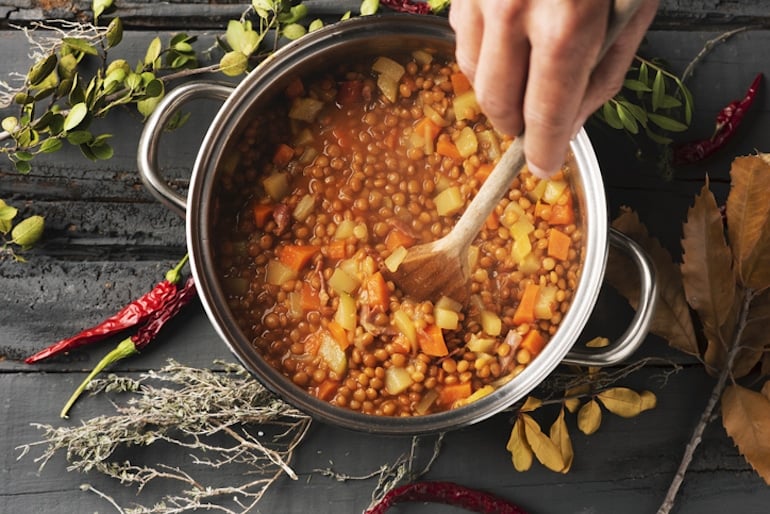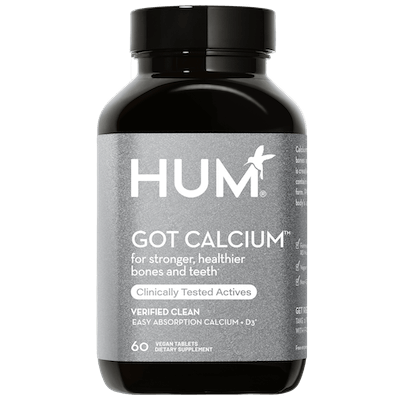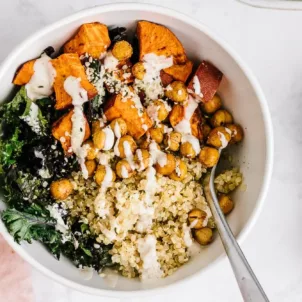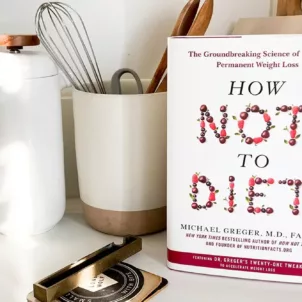THE WELLNEST • Food • Healthy Eating
A Dietitian Debunks 5 Plant-Based Diet Myths
By Jessica Bippen, MS, RD •
March 11, 2020
Jessica Bippen, MS, RD, puts five plant-based diet myths to rest.
Have you thought about adopting a whole-food plant-based diet, only to reconsider after hearing you wouldn’t get enough protein? This misconception is only one of the many about plant-based diets.
With so much misinformation out there, it’s easy to shy away from this healthy way of eating. But now it’s time to set the record straight by looking at nutritional truths behind plant-based diets.


5 Plant-Based Diet Myths, DebunkeD
Myth #1: You can’t get enough protein on a plant-based diet
This myth is the most common by far—but protein is abundant in all foods. Yes, that’s right! All foods (even fruit!) contain protein. And while fruit isn’t considered a “good” source of protein, it just goes to show that protein isn’t limited to animal products. For most people, the Recommended Daily Allowance (RDA) for protein is 0.8 grams of protein per kilogram of healthy body weight. You can easily meet this quota through a plant-based diet. Good sources of plant-based protein include bean, lentils, tofu, tempeh, nuts, seeds, and whole grains. If you’re eating a wide variety of foods and meeting your necessary calorie level, you can easily meet your protein needs.
Myth #2: You’ll Be Deficient In B12
Vitamin B12 is a water-soluble vitamin that the body needs to produce red blood cells, synthesize DNA, and maintain optimum neurological function. It also helps the body with its metabolic functions, including turning food into energy. Subtle symptoms of B12 deficiency include fatigue, weakness, and difficulty thinking. Among others, more severe symptoms include numbness or tingling in the hands/feet, shortness of breath, and a swollen tongue. B12 is almost exclusively present in animal products because it’s made by soil bacteria that animals eat; once ingested, the B12 remains in their bodies. There are no reliable sources of plant-based B12 found in nature. However, you can find plant-based products fortified with B12. These include nutritional yeast, cereals, and some plant-based milks, yogurts, and cheeses. Most people think that only vegans or plant-based dieters need to supplement with vitamin B12. However, low B12 levels can occur even in individuals who consume animal products. But how come? You need a protein called intrinsic factor to properly absorb B12. Many people don’t naturally produce this protein, or they start producing less of it as they age. In most cases, plant-based eaters should supplement with vitamin B12. However, others may wish to get their B12 levels tested if they experience the symptoms mentioned above.Myth #3: You need dairy for strong bones
Calcium is the most abundant mineral in the body. It’s needed for bone health, heartbeat regulation, effective blood clotting, and other metabolic functions. Yet despite Got Milk? campaigns and other dairy-industry funded research, these pro-dairy guidelines are outdated. New research shows that dairy isn’t as bone-protective as we thought. It also shows that calcium alone has no benefit in reducing fracture risk. Even the Harvard Nurses’ Health Study shows no correlation between increased dairy consumption and lowered risk of hip or arm fractures due to loss of bone tissue. For strong bones, your body needs a combination of vitamin D, vitamin K, magnesium, and calcium. You can meet your calcium requirements by choosing calcium-rich plant foods. These include dark leafy greens, cruciferous vegetables, sesame seeds, tahini, almonds, fortified plant-based milks and yogurts, and calcium-set tofu. However, if you find it hard to eat these foods daily, taking a supplement that contains both calcium and vitamin D can be beneficial.Myth #4: Plant-Based Diets are Expensive
Plant-based diets get a bad rap for being expensive. However, this myth couldn’t be further from the truth! Most plant-based foods—including lentils, beans, grains, and seasonal produce—are among the most affordable. Larger expenses arise when you choose to purchase “fancy” plant-based foods like nut-based cheeses, alt milks, ice creams, and packaged snacks. For greater savings, purchase your plant-based staples from the bulk bins. This grocery hack cuts costs because companies don’t need to spend extra on packaging. Plus, you reduce waste by only purchasing the exact amount you need. Buying in-season, fresh produce can help your wallet too. If it’s out of season, consider purchasing frozen or canned fruits and vegetables. You can also take things a step further by taking the time to meal prep. In the long run, meal prep saves time and money, and prevents unnecessary food waste.
Myth #5: It’s harder to gain muscle on a plant-based diet
This common plant-based diet myth follows closely behind the one concerning protein. Many people in the fitness world who care deeply about muscle growth and physical performance have trouble accepting that meat isn’t required to gain muscle. But in order to gain muscle, you both protein and carbohydrates, along with the correct exercise routine. Research shows that increases in muscle mass and strength are associated with protein, regardless of the source. In other words, your body is smart and doesn’t differentiate whether the protein comes from plant or animal sources. Need role models? Strongman competitor Patrik Baboumian, ultra-endurance athlete Rich Roll, and countless other Olympians and bodybuilders all follow a plant-based diet.More like this









